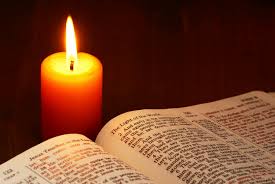
In this post we’re looking at that old favourite of Evensong, ‘Glory to thee, my God, this night’ by Thomas Ken (1637-1711), set to TALLIS’S CANON by Thomas Tallis (c.1505-85). Both author and composer, though of different inclinations, struggled to walk the fine line through the Catholic-Protestant divides of the sixteenth and seventeenth centuries.
Thomas Ken’s reputation is such that he is considered a father of English hymnody, and his work will be further examined in future posts. A student of Winchester College, he became an Oxford don and vicar of several parishes before returning to Winchester in 1672 to become a prebendary of the cathedral and fellow of the College. It was here that he wrote several hymns for the daily office, of which ‘Awake, my soul, and with the sun’ is for the morning and ‘Glory to thee’ for the evening. Ken became one of Charles II’s chaplains in 1680 and courted controversy three years later when he refused to lend his Winchester lodgings to royal mistress Nell Gwynne.
His spirited stand made an impression on the king who, far from being displeased, granted Ken the bishopric of Bath and Wells the following year. He was one of the Seven Bishops who refused to grant James II’s Declaration of Indulgence, and was tried and acquitted of seditious libel. But despite his suspicion of Catholicism, he refused to break his oath to James and swear a new one in favour of his Protestant successor, William of Orange. Ken was deprived of his bishopric and retired to Wiltshire, where he died in 1711. A later commentator regarded Ken’s character as ‘as near as human infirmity permits to the ideal perfection of Christian virtue’.
We know virtually nothing about the early life of Thomas Tallis, and he first appears on the record as organist at Dover Priory in 1532. He became a Gentleman of the Chapel Royal in 1543, playing and composing for four successive monarchs: Henry VIII, Edward VI, Mary I and Elizabeth I. The latter granted Tallis and his pupil William Byrd a monopoly on writing and publishing polyphonic choral music. However this naturally courted resentment, and Tallis’s music did not sell well during his lifetime. He also managed to remain a devout Roman Catholic in an era of constant and dizzying religious unrest. Despite this, he appears to have stayed in favour with all of his royal patrons.
His work reflects the prevailing mood of the time: when Archbishop Cranmer recommended that devotional singing be less melismatic than syllabic, Tallis changed his style, and when Elizabeth’s ministers allowed more florid music to be sung at certain times of day, Tallis again obliged. His ‘Canon’ – originally a setting of Psalm 67 – was first published in 1567, and the accepted version of it today having been collected and modified by Thomas Ravenscroft in 1621.
A 1973 version from King’s College, Cambridge:
https://www.youtube.com/watch?v=thMQEuKYTLE
Michael Raillard gives us a Prelude on the Canon:
https://www.youtube.com/watch?v=9tVIaezd02I
And a version from Maastricht:
https://www.youtube.com/watch?v=N2sMXo5vqkc
We’ve tried something different for this downloadable descant. The inside voices of the harmony remain the same, but with a fugue-like bassline added. This and the treble descant imply only a few new harmonies, so as to keep the impression of the original. It’s free to download and use, so please do so, and let us know how you get on. As ever, we’d be delighted to receive any audio or video of your attempts.
If you’re using Thomas Ken’s hymn in a lesson, try considering the following points:
- The hymn’s origins as a divine office for evening;
- The ideas of redemption (verse 1), resurrection (verse 2), service (verse 3) and comfort (verse 4);
- The nature of the doxology in the final verse, and a comparison with other examples.
- The regular metre of the text (Long Metre, or 88.88.) and how this reinforces the themes.
- A comparison to other hymns with similar themes, such as ‘The day thou gavest, Lord, is ended’ (John Ellerton), ‘Abide with me’ (Henry Lyte), ‘God, that madest earth and heaven’ (Reginald Heber and Richard Whately), or Thomas Ken’s own ‘Awake, my soul, and with the sun’.
Does this hymn grant comfort in the end of a challenging day? Or simply remind you of sunlit summer evenings in country churches? As ever, do let us know your thoughts in the comment section below.

